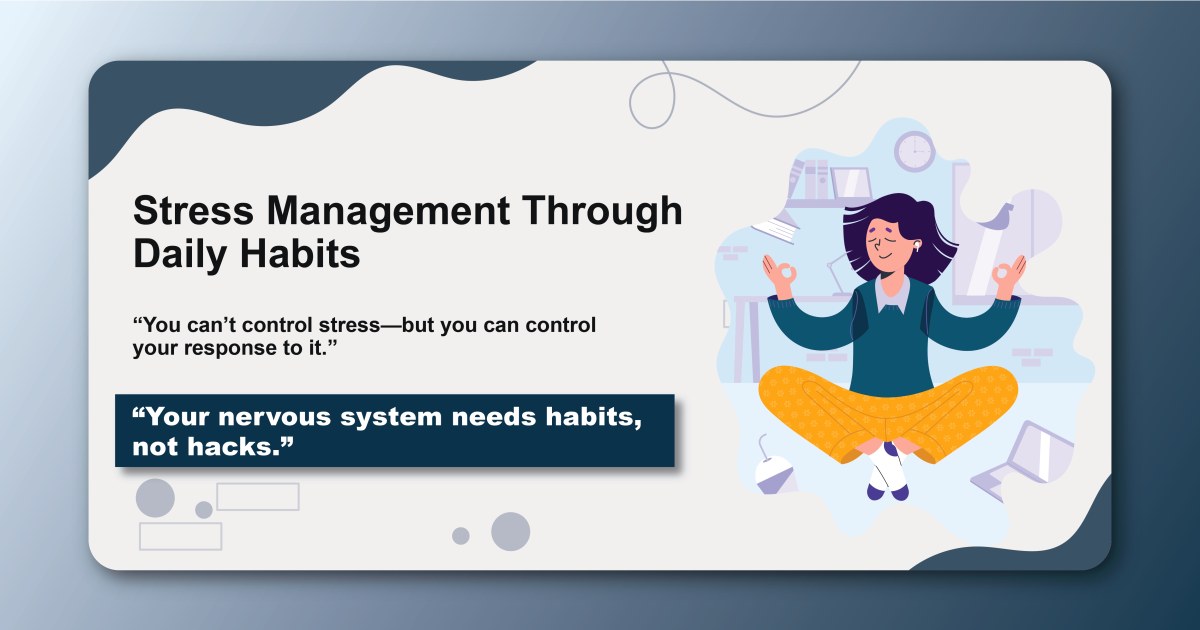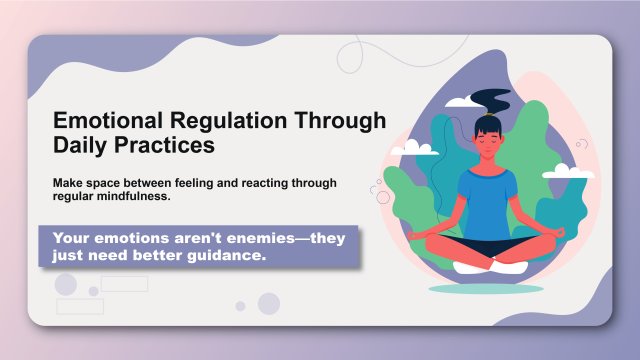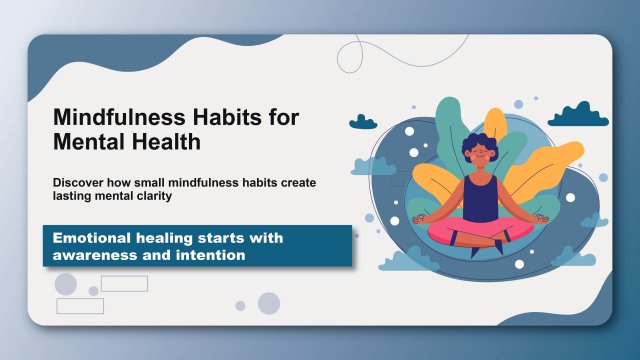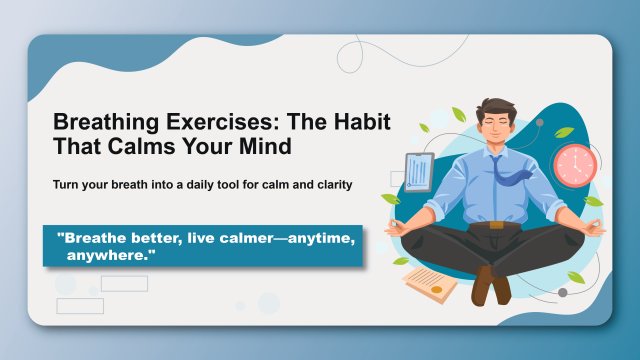Stress isn't something that happens to you—it's something you can actively manage and transform through the power of daily habits. While we can't eliminate all sources of stress from our lives, we can build resilience, develop coping strategies, and create daily practices that help us navigate challenges with greater ease and confidence.
The most effective stress management doesn't happen during crisis moments—it happens through the small, consistent practices you build into your daily routine. These habits create a foundation of resilience that helps you weather life's inevitable storms while maintaining your physical health, mental clarity, and emotional well-being.
Modern research shows that regular stress management practices don't just help you feel better in the moment—they literally rewire your brain to handle stress more effectively over time. When you build stress management into your daily routine, you're not just reacting to stress; you're proactively building the mental and physical resources that make you more resilient to future challenges.
The key is understanding that stress management is a skill that improves with practice. Just like physical fitness, emotional resilience grows stronger when you exercise it regularly through consistent daily habits.
Understanding Stress and Its Impact
The Physiology of Stress
The Stress Response System When you encounter stress, your body activates the sympathetic nervous system, releasing cortisol and adrenaline. This "fight or flight" response was designed for short-term threats, not the chronic stressors of modern life.
Chronic Stress Effects
- Elevated cortisol levels disrupt sleep, digestion, and immune function
- Increased inflammation contributes to various health problems
- Impaired cognitive function affects decision-making and memory
- Emotional dysregulation leads to anxiety, irritability, and depression
The Recovery Process Your parasympathetic nervous system is responsible for the "rest and digest" response that helps you recover from stress. Daily habits can strengthen this system and improve your body's ability to return to baseline after stressful events.
Modern Stress Challenges
Information Overload: Constant news, notifications, and digital stimulation keep your nervous system in a heightened state.
Always-On Culture: The expectation of constant availability blurs work-life boundaries and prevents natural recovery periods.
Social Comparison: Social media and competitive environments create chronic low-level stress through comparison and FOMO.
Uncertainty and Change: Rapid societal changes and uncertain futures trigger our brain's threat detection systems.
The Science of Stress-Reducing Habits
Neuroplasticity and Stress Response
Brain Rewiring: Regular stress management practices literally change your brain structure, strengthening areas associated with emotional regulation and weakening overactive stress circuits.
Prefrontal Cortex Strengthening: Mindfulness and breathing practices enhance the brain region responsible for emotional regulation and decision-making.
Amygdala Regulation: Consistent stress management habits help calm the brain's alarm system, reducing reactivity to perceived threats.
Hormonal Balance
Cortisol Regulation: Daily stress management practices help normalize cortisol rhythms, improving sleep, digestion, and immune function.
Neurotransmitter Support: Regular habits that reduce stress naturally boost serotonin, dopamine, and GABA production.
Endorphin Release: Physical activity and other stress-reducing habits trigger the release of natural mood elevators.
Foundation Habits for Stress Management
Breathing Practices
4-7-8 Breathing Technique
- Inhale for 4 counts
- Hold for 7 counts
- Exhale for 8 counts
- Repeat 3-4 cycles
Box Breathing
- Inhale for 4 counts
- Hold for 4 counts
- Exhale for 4 counts
- Hold for 4 counts
- Continue for 5-10 cycles
Diaphragmatic Breathing
- Place one hand on chest, one on belly
- Breathe so that only the belly hand moves
- Focus on slow, deep breaths
- Practice for 5-10 minutes daily
Mindfulness and Meditation
Mindful Moments
- Take 60 seconds to notice your breath
- Observe your surroundings with all five senses
- Practice during routine activities (eating, walking, washing dishes)
- Focus on present moment awareness
Progressive Muscle Relaxation
- Systematically tense and release muscle groups
- Start with toes and work up to head
- Hold tension for 5 seconds, then release
- Notice the contrast between tension and relaxation
Loving-Kindness Meditation
- Begin with sending compassion to yourself
- Extend loving wishes to loved ones
- Include neutral people and even difficult people
- Cultivates positive emotions and reduces stress
Physical Movement
Gentle Movement
- 10-minute morning stretches
- Evening yoga or tai chi
- Walking meditation
- Dance to favorite music
Nature Connection
- Spend time outdoors daily, even briefly
- Practice "forest bathing" or mindful nature observation
- Garden or tend to plants
- Listen to natural sounds
Tension Release
- Shoulder rolls and neck stretches
- Progressive muscle relaxation
- Self-massage techniques
- Hot baths or showers
Building Your Daily Stress Management Routine
Morning Stress Prevention
Calm Morning Start
- Wake up 15 minutes earlier to avoid rushing
- Begin with 5 minutes of deep breathing or meditation
- Set positive intentions for the day
- Avoid checking phones/news immediately upon waking
Grounding Practices
- Feel your feet on the floor when you get up
- Notice the temperature and textures around you
- Practice gratitude by naming three things you appreciate
- Drink water mindfully and notice the sensation
Energy Management
- Light exposure to regulate circadian rhythms
- Gentle movement to activate your body
- Nourishing breakfast to stabilize blood sugar
- Prioritize your most important tasks when energy is highest
Midday Reset Strategies
Micro-Breaks
- 2-minute breathing exercises between meetings
- Stretch at your desk or walk around the building
- Practice mindful eating during lunch
- Step outside for fresh air and natural light
Stress Interruption
- Notice early stress signals (tight shoulders, shallow breathing)
- Use the STOP technique: Stop, Take a breath, Observe, Proceed mindfully
- Practice the 5-4-3-2-1 grounding technique
- Reframe stressful thoughts with perspective questions
Boundary Setting
- Take actual lunch breaks away from work
- Limit news consumption and social media checking
- Practice saying "no" to non-essential requests
- Create "do not disturb" times for focused work
Evening Recovery Practices
Transition Rituals
- Change clothes when arriving home to signal work-life transition
- Take 5 minutes to decompress before engaging with family
- Practice the "three good things" gratitude exercise
- Review the day and acknowledge accomplishments
Stress Processing
- Journal about challenges and emotions
- Practice the "worry time" technique—set aside 15 minutes for concerns
- Talk through stressful events with trusted friends or family
- Use creative expression (art, music, writing) to process emotions
Preparation for Rest
- Create a calming environment with dim lights and comfortable temperature
- Practice relaxation techniques like gentle yoga or meditation
- Avoid stimulating activities 1-2 hours before bed
- Focus on positive or neutral thoughts before sleep
Stress Management Habits by Category
Cognitive Habits
Perspective Reframing
- Ask: "Will this matter in 5 years?"
- Practice the "best case, worst case, most likely case" exercise
- Look for learning opportunities in challenges
- Focus on what you can control vs. what you cannot
Mindful Awareness
- Notice and name emotions without judgment
- Observe thoughts without believing them all
- Practice the "noting" technique during meditation
- Cultivate the witness perspective
Positive Mental Training
- Daily gratitude practice (3 specific things you appreciate)
- Loving-kindness meditation for yourself and others
- Visualization of successful outcomes
- Affirmations based on personal values and strengths
Physical Habits
Regular Exercise
- Find movement you enjoy and can sustain
- Include both cardiovascular and strength training
- Practice yoga or other mind-body activities
- Walk in nature whenever possible
Nutrition for Stress
- Limit caffeine, especially in afternoon/evening
- Reduce sugar and processed foods that create energy spikes
- Include omega-3 fatty acids and magnesium-rich foods
- Stay hydrated throughout the day
Sleep Optimization
- Maintain consistent sleep and wake times
- Create a relaxing bedtime routine
- Limit screen time before bed
- Ensure your bedroom is cool, dark, and comfortable
Social and Environmental Habits
Connection Practices
- Regular check-ins with supportive friends and family
- Practice active listening in conversations
- Offer help or kindness to others
- Join communities aligned with your interests and values
Environment Design
- Create calm, organized spaces at home and work
- Use natural elements (plants, natural light, fresh air)
- Minimize clutter and distractions
- Designate spaces specifically for relaxation
Boundary Management
- Learn to say no to commitments that drain your energy
- Limit exposure to negative news and toxic relationships
- Create technology-free zones and times
- Communicate your needs clearly and kindly
Advanced Stress Management Strategies
Stress Inoculation
Gradual Exposure
- Gradually expose yourself to manageable stressors to build resilience
- Practice stress management techniques during low-stress periods
- Build confidence through small challenges before facing larger ones
- View stress as a teacher rather than an enemy
Cold Exposure
- Cold showers or ice baths to build stress tolerance
- Controlled breathing during cold exposure
- Gradual adaptation to build resilience
- Transfer skills to other stressful situations
Challenging Workouts
- High-intensity exercise to practice managing physical stress
- Breathing techniques during demanding physical activity
- Mental coaching during challenging moments
- Building confidence in your ability to handle discomfort
Stress Recovery and Restoration
Active Recovery
- Gentle movement on rest days
- Restorative yoga or stretching
- Massage or self-massage techniques
- Float tanks or sensory deprivation experiences
Creative Expression
- Art, music, or writing for emotional processing
- Dancing or movement for joy and release
- Crafts or hobbies that require focus and creativity
- Gardening or cooking as meditative practices
Social Recovery
- Spending time with supportive, positive people
- Group activities that bring joy
- Volunteering or helping others
- Sharing experiences and emotions with trusted individuals
Personalizing Your Stress Management Approach
Identifying Your Stress Patterns
Stress Triggers
- Notice what situations, people, or thoughts trigger stress
- Track patterns in timing (certain days, times, seasons)
- Identify early warning signs (physical, emotional, behavioral)
- Understand your unique stress signature
Stress Responses
- Notice how stress manifests in your body
- Identify your typical emotional reactions
- Recognize behavioral changes during stressful periods
- Understand what helps you recover most effectively
Individual Preferences
- Some people prefer active stress relief (exercise, movement)
- Others prefer calm activities (meditation, reading)
- Consider whether you're more social or solitary in stress recovery
- Experiment to find what works best for your personality and lifestyle
Creating Your Personal Protocol
Emergency Stress Tools
- 2-3 techniques you can use anywhere, anytime
- Quick practices for immediate stress relief
- Longer practices for deep restoration
- Support resources (people, places, activities)
Daily Maintenance Practices
- Morning routine for stress prevention
- Midday practices for stress interruption
- Evening practices for stress recovery
- Weekly practices for deeper restoration
Seasonal and Situational Adaptations
- Adjust practices for busy vs. calm periods
- Seasonal modifications (summer vs. winter approaches)
- Travel-friendly stress management tools
- Crisis protocols for especially challenging times
Common Obstacles and Solutions
"I Don't Have Time"
Reality Check: Stress often creates the feeling of time scarcity. Regular stress management actually creates more time by improving efficiency and decision-making.
Solutions:
- Start with 2-minute practices
- Integrate stress management into existing activities
- Use transition times for brief practices
- Remember that preventing stress takes less time than recovering from it
"It Doesn't Work for Me"
Exploration: Different techniques work for different people and different types of stress.
Solutions:
- Try various approaches before deciding
- Give new practices at least 2 weeks of consistent trial
- Adapt techniques to fit your personality and preferences
- Consider combining multiple approaches
"I Forget to Practice"
Habit Integration: The most effective practices become automatic parts of your routine.
Solutions:
- Link stress management to existing habits
- Use environmental cues and reminders
- Start with one practice and build gradually
- Track your practice to build momentum
"I Feel Worse at First"
Normal Response: Some people initially feel more aware of stress when they start paying attention to it.
Understanding:
- Increased awareness is the first step to management
- Emotions may surface that were previously suppressed
- Your nervous system may need time to adjust to new practices
- Consider working with a therapist if emotions feel overwhelming
Stress management through daily habits isn't about eliminating all stress from your life—it's about building the resilience and skills to navigate life's challenges with greater ease and confidence. When you make stress management a daily practice rather than a crisis intervention, you create a foundation of well-being that supports everything else you want to achieve.
The habits you build today determine how well you'll handle tomorrow's challenges. Start small, be consistent, and trust that each practice is building your capacity for resilience. Remember that managing stress is a skill that improves with practice, and the investment you make in your stress management habits will pay dividends in every area of your life.
Your relationship with stress can be transformed through the power of daily practice. When you commit to regular stress management habits, you're not just managing current stress—you're building the emotional and physical resources that will serve you for a lifetime.
Ready to transform your relationship with stress through daily habits? Build and track stress management practices with Habityzer and experience how consistent daily habits can create lasting resilience and well-being.



